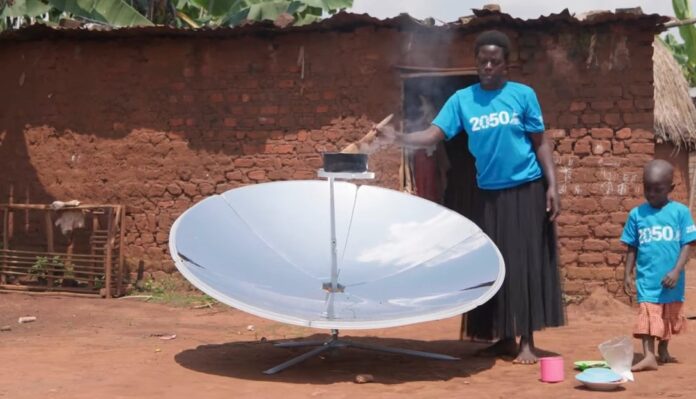In this blog post, we embark on an insightful journey into the 2050 Paris Solar Cooker Programme, a pioneering initiative leading the charge in sustainable cooking methods. This innovative programme is a beacon of hope in the fight against environmental degradation, underscoring the critical importance of eco-friendly culinary practices. Our exploration will uncover the multifaceted aspects of this initiative, highlighting how the city of Paris is reshaping the future of cooking towards a more sustainable, greener world. As we delve into the programme’s intricacies, we’ll discover how it’s set to revolutionize the culinary landscape, offering a template for cities worldwide to follow.
Solar Cookers Basics
Solar cookers are a remarkable testament to human ingenuity, harnessing the boundless energy of the sun to cook food. These devices use reflective materials to concentrate sunlight, creating heat sufficient to cook meals without any fuel or electricity. Their eco-friendly nature lies in their reliance on renewable solar energy, eliminating the need for fossil fuels and thereby significantly reducing carbon emissions. This innovative cooking method not only contributes to environmental sustainability but also offers a practical solution in areas with limited access to traditional energy sources.
Paris’ Green Initiatives
Paris has long stood as a global leader in environmental sustainability, with a commitment to green initiatives that stretches far beyond the romanticized cityscape. The city’s concerted efforts to combat climate change are evident in its ambitious policies and programs. The 2050 Paris Solar Cooker Programme is a standout example of these initiatives, embodying the city’s determination to create a more sustainable and eco-friendly urban environment. This program is not merely an isolated effort but part of a comprehensive strategy to reduce carbon footprints, enhance urban living, and lead by example in the global battle against climate change. It represents a significant step in Paris’s journey towards becoming a fully sustainable city, blending innovation with tradition in its unique approach to environmental stewardship.
Objectives of the Programme
The primary goals of the 2050 Paris Solar Cooker Programme are as visionary as they are essential. Its foremost objective is to significantly reduce greenhouse gas emissions, contributing to the global effort to combat climate change. By promoting the use of solar cookers, the program aims to decrease reliance on traditional, non-renewable energy sources, thereby fostering a culture of sustainability within the Parisian community. Additionally, it seeks to enhance the overall quality of life for residents by providing a cleaner, healthier cooking alternative. This initiative not only addresses environmental concerns but also aligns with the broader objectives of sustainable urban development, showcasing Paris’s commitment to creating a greener, more livable city for future generations.
Solar Cooker Implementation
Implementing solar cookers across Paris is a bold and transformative step. The programme plans to integrate these eco-friendly devices into the fabric of the city, making them accessible to all residents. It involves forming strategic partnerships with local communities, businesses, and environmental organizations, ensuring a collaborative and inclusive approach. By involving various stakeholders, the program seeks to create a widespread network of support and adoption. The initiative also focuses on making solar cookers affordable and user-friendly, encouraging widespread use. This approach not only promotes environmental sustainability but also fosters community spirit and cooperation, creating a shared vision for a greener Paris.
Benefits of Solar Cooking
The advantages of cooking with solar cookers are manifold and extend beyond environmental benefits. They offer a practical solution to reduce energy bills, providing significant savings for households. This economic benefit is especially crucial for low-income families, making sustainable cooking accessible to all. The health benefits are also notable, as solar cooking eliminates the smoke and pollutants associated with traditional cooking methods, ensuring cleaner air and a healthier living environment. Moreover, by reducing reliance on fossil fuels, solar cookers contribute to a lower carbon footprint, playing a vital role in the fight against climate change.
Culinary Diversity
The adaptability of solar cookers to a wide range of culinary styles is a testament to their versatility. They are capable of cooking a diverse array of dishes, from traditional French cuisine to international flavors, catering to the cosmopolitan palate of Paris. This adaptability enhances the city’s rich culinary heritage, allowing chefs and home cooks alike to experiment with different recipes and techniques. The potential for creating unique, culturally diverse culinary experiences is immense, offering an exciting avenue for culinary innovation. Solar cookers thus not only serve as a tool for sustainable cooking but also as a medium for cultural expression and exploration, enriching Paris’s gastronomic landscape.
Training and Education
Educating residents about the benefits and usage of solar cookers is crucial to the success of the 2050 Paris Solar Cooker Programme. The city has initiated a series of workshops and training programs to familiarize individuals with these devices. These educational initiatives aim to empower citizens, equipping them with the knowledge and skills to effectively use solar cookers in their daily lives. By fostering a deeper understanding and appreciation for sustainable cooking practices, the programme is nurturing a community that is conscious of its environmental impact and committed to making a positive change.
https://www.facebook.com/2050Paris
https://twitter.com/2050_paris
Monitoring and Evaluation
To measure the impact of the 2050 Paris Solar Cooker Programme, a comprehensive monitoring and evaluation system is in place. This system uses a range of key performance indicators to assess the effectiveness of the programme in achieving its objectives. These indicators include the number of solar cookers distributed, the reduction in carbon emissions, and the level of community engagement. Regular assessments and transparent reporting are essential to maintaining the integrity of the programme, allowing for continuous improvement and adaptation. This focus on accountability and results ensures that the programme remains effective and responsive to the needs of the Parisian community, setting a standard for similar initiatives worldwide.
Challenges and Solutions
The implementation of solar cookers in a bustling metropolis like Paris presents various challenges, including logistical issues, public acceptance, and maintenance. To address these challenges, the programme has developed a range of solutions, such as innovative design features to integrate cookers into urban settings, awareness campaigns to build public support, and maintenance networks to ensure long-term functionality. These solutions are tailored to meet the unique needs of Paris, demonstrating the programme’s adaptability and commitment to overcoming obstacles.
Community Engagement
Community engagement is the cornerstone of the 2050 Paris Solar Cooker Programme. The initiative actively involves local residents, fostering a sense of ownership and pride in the project. Through community-driven activities and participatory decision-making, the programme ensures that the implementation of solar cookers aligns with the needs and aspirations of the community. This approach not only enhances the effectiveness of the programme but also strengthens the social fabric of the city, creating a united front in the pursuit of sustainability.
Conclusion
The 2050 Paris Solar Cooker Programme is a pioneering initiative that exemplifies the city’s commitment to sustainability and innovation. This post has highlighted the multifaceted aspects of the programme, from its environmental impact to its cultural significance. By embracing sustainable cooking practices, Paris is setting a precedent for cities around the world, demonstrating that environmental responsibility and culinary excellence can go hand in hand.












